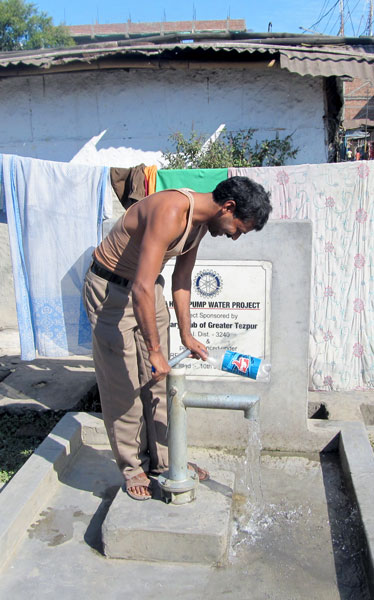Can you imagine what is in the water we drink?” asks Rtn Shivani Tiberwal, President, RC Greater Tezpur, D 3240. She is shocked that her State of Assam, “tucked in between the foothills of the Himalayas and the Brahmaputra River, has about 17,692 water sources that contain excessive components of iron, arsenic and fluoride, posing a grave threat to people’s health.” A survey conducted by IIT Guwahati and the Public Health Engineering Department that revealed that more than 7,00,000 people in the State were exposed to arsenic contamination.

The cases of Hemochromatosis, a genetic disorder, caused by excessive absorption of iron from water began to rise in the State and the need to provide safe drinking water became a priority. Piped water supply with the provision of aeration and filtration was proposed to tackle the problem of excess iron in drinking water. While the Indian Government installed this scheme under its National Rural Drinking Water Programme, RC Greater Tezpur decided in 2008 to provide safe and clean drinking water at public places, schools and colleges under its project Jeevan Dhara.
Water booths
Considering the number of footfalls at different locations, the club zeroed down on Thakurbari Temple Complex that had about 1,00,000 people visiting every day. The booth cost Rs 1,35,000 and the money was donated by the Club and its maintenance was handed over to the Temple’s Trust. This water booth was initially installed with a traditional sand-filter, but has now been upgraded to an Aquaguard.
About 17,692 water sources in Assam are high in iron, arsenic and flouride components.
Situated near the Civil Hospital, it also provides a big relief to the visitors and patients’ attendants. “I have been drinking water here for the last three years and when I go back home I take some water for my wife,” says Charnak, a rickshaw puller.
The T-pumps
“We came across Garwany Patty which is home to 50 poor families. The contamination level in the water was high,” says Shivani. The Rotarians raised funds and installed T-pumps — a self-powered hand pumping system that pushes water through a filter delivering clean water in less than 10 seconds. More locations were identified; and with funds generated from the District grant and members contributions, T-pumps were set up at various other localities.
RO for colleges and schools
In its next step the club plans to install water filters at municipal schools. An RO filtration facility was installed at the Tezpur College that caters to 2,800 students. “Various clubs have now started implementing the same model in their regions and are providing safe drinking water,” concludes the Club President.





